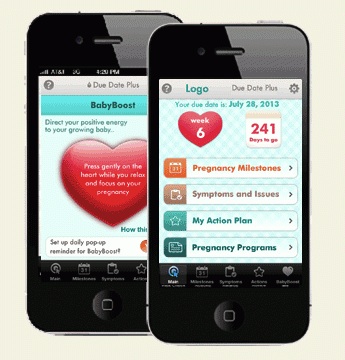
Wildflower Health's Due Date Plus app.
Rock Health held the demo day for its fourth class this week, highlighting some impressive accomplishments from its newest batch of 14 portfolio companies. Last year, MobiHealthNews reported that this class would start with an increased $100,000 investment from Rock Health, shortly after the incubator signed on Kleiner Perkins Caufield Byers. This is also the first class to benefit from new Rock Health advisor Kaiser Permanente.
Rock Health companies have the third highest average valuation of any incubator according to Angel List, at $5.2 million (behind StartX and Y-Combinator). Rock says the incubator's portfolio companies have raised $43 million to date, not including investments from Rock itself, averaging about $900,000 per startup. The current class accounts for $13.9 million of that total.
Rock noted in its press release that its current class is targeting a wide variety of customers: consumers, employers, and hospitals.
Consumer companies include Beam Technologies, makers of the Beam Brush, the FDA-cleared smart toothbrush that made a splash at CES, and Wello, a startup offering affordable one-on-one training sessions over two-way video chat. Wello raised $1 million in December, with Rock-partner Kleiner Perkins leading the round. The company launched group workouts this week, allowing friends around the world to work out together with a Wello trainer.
Several more of the companies focus on creating innovative health apps. Mango Health, which recently received $3.1 million in seed funding, has released its iOS app, which seeks to improve medication adherence through gamification. The app includes a rewards system where users can earn points for taking their pills and exchange them for real-world gift cards. SuperBetter, an online application, also uses gamification principles to help people reach health goals like working through depression or trying to lose weight.
Other apps target specific challenges for the consumer. LabDoor is an iOS app that can scan supplements and over-the-counter medications and return grades based on safety and efficacy -- determined through investigation up to and including independent lab work. Moxe Health, through products like triage.me, aims to help the underinsured find the best care they can afford, and reduce unnecessary emergency room visits. Wildflower Health creates apps to help women stay healthy throughout pregnancy. It's first app, Due Date Plus, helps women keep track of doctor visits and track symptoms.
A number of the companies in the fourth class are building tools for providers rather than patients. CliniCast is aiming to ease the transition from fee-for-service to fee-for-value healthcare by selling providers predictive analytics that help minimize costs and maximize outcomes. Eligible is developing a REST API with the goal of standardizing and simplifying health eligibility requests (which founder Katelyn Gleason describes as a "mind-bogglingly broken" space in healthcare). Eligible raised $1.5 million and counts practice management system Kareo.com as one of its largest customers. KitCheck reduces the time, money, and potential for error in assembling medication kits. Rock Health reports they already have six-digit revenues from multiple hospital customers.

Beam Technologies' Beam Brush
Wellframe is building a system to hopefully reduce readmissions by giving patients an app with day-to-day instructions for managing a condition or enhancing recovery from a surgery or procedure. OpenPlacement also deals with continuing care, helping match seniors with housing and assisted living options. The company already has 500 facilities listing open beds on its platform.
Finally, a couple of Rock Health companies are working with employers. Benefitter, formerly called BenefitsMe, is a tool for navigating the upcoming health insurance changes due to the Afforcable Care Act. The company promises to help employers determine what the most cost-effective coverage option is for both company and employees. The company raised $2.7 million from angel investors. Zipongo, a company which aims to motivate healthy eating with personalized meal plans and digital coupons, is currently positioning itself as a consumer product. But according to Rock, the company has established relationships with a number of payers, and has secured "a multi-million dollar deal with a national retailer" after raising $2 million in seed funding.

















